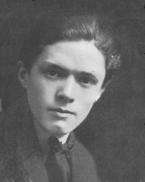William Baines
William Baines (26 March 1899 – 6 November 1922) was an English pianist and composer who wrote more than 150 works for solo piano and a number of larger orchestral works before his death from tuberculosis at the age of 23.[1]

Life
Born in Horbury near Wakefield, Yorkshire, Baines came from a musical family. His father was a cinema pianist and organist at a Primitive Methodist Chapel.[2] Encouraged by his parents, Baines began piano lessons at a young age and had formal lessons at the Yorkshire Training College of Music in Leeds, although his later compositional style was largely self-taught. In 1913 the family moved to Cleckheaton and whilst there Baines attended Bradford Permanent Orchestral Society concerts and acquainted himself with the basic orchestral repertoire. The family moved to York in 1917 where, aged 18, Baines became a professional musician and gave his first public piano recital at which a number of his original compositions were heard. He wrote a symphony which was not performed until 1991.[2]
In 1918 Baines was conscripted into the British Army during the last months of World War I. Within a fortnight of being called up, he was hospitalised due to septic poisoning. The war was over by the time he was discharged, and his health, already delicate, never fully recovered.[2] He continued to compose and give recitals until a few months before his death, although his only major recital outside Yorkshire was in Bournemouth at the invitation of the conductor Sir Dan Godfrey in 1921.[2]
Works
Despite his youth, William Baines completed roughly 150 works, mostly in the genre of the piano miniature and he left a symphony, a poem for piano and orchestra and a number of chamber works. Many of his piano works are influenced by the natural world, and often have descriptive titles. Perhaps his best known works are the piano portrait "Goodnight to Flamboro'" and "The Lone Wreck" comprising the collection Tides, named after Flamborough Head, the promontory on the Yorkshire coast. His Seven Preludes from 1919 are considered to be amongst his finest compositions.[2] His Symphony in C minor was premiered by the Airedale Symphony Orchestra at the Grassington Festival in 1991.[3]
Baines was the subject of a 90-minute drama written by Martyn Wade for BBC Radio 3 first broadcast in 1989, called Goodnight to Flamboro', which traced the final months of his life.[4] It was repeated on BBC Radio 4 Extra in September 2011, June 2013 and April 2015. His piano works have twice been recorded by Eric Parkin – once for the Lyrita label, and later, a fuller selection on Priory. A number of Baines works (including some first recordings) have been recorded by Alan Cuckston, on Swinsty Records.
Selected works
Orchestral
- Symphony in C minor (1917)
- Island of the Fay (1919)
- Prelude to a Doll's Ballet (1920)
- Poem for piano and orchestra (1921)
- Thoughtdrift (1921)
Chamber
- Andante for string quartet (1922)
- Aubade for string quartet (1917)
- Dream Temple for violin and piano (1920)
- Marionettes for violin and piano (1919)
- Piano Trio (1918)
- Rhapsody in F♯ minor for string quartet (1920)
- Sonata in G for violin and piano (1917–19)
- String Quartet in E major (1917–18)
- Two Fragments for string quartet (1920–21)
Piano
- Sonata in A minor (1917)
- Four Sketches (1917–18)
- Introduction & Waltz Caprice (1918)
- Poem, Op. 6, No. 2 (1918)
- Paradise Gardens (1918–19)
- Seven Preludes (1919)
- Coloured Leaves (1919–20)
- Four Poems (1919–20)
- Three Concert Studies (1919–20)
- Milestones (1920)
- Tides (1920)
- Sonata in F♯ minor (incomplete) (1918–21)
- Prelude (in G) (1921)
- Silverpoints (1921)
- Twilight Pieces (1921)
- Wind Sprites (1921)
- Prelude and Seven Diversions for two pianos (1921)
- Pictures of Light (1920–22)
- A Last Sheaf (1921–22)
- Nocturne from Sonata in F♯ minor (1922)
- Shade-Imagery (1922)
Vocal
- Five Songs (1919)
References
- Celebrating Baines, Richard Bell, Wild Yorkshire, retrieved 21 January 2011
- John France, William Baines, Musicweb International, 2002
- Peter Joelson, Lyrita – William Baines & E. J. Moeran piano works, MusicSource
- Goodnight to Flamboro', bbc.co.uk